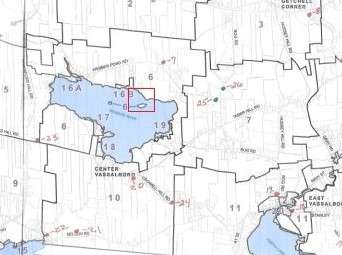Up and down the Kennebec Valley: Caring for the poor – Part 2
by Mary Grow
How towns cared for their poor
This article will continue the theme started June 14, how central Kennebec Valley towns took care of their poor residents, jumping across the Kennebec River from Augusta and Sidney to Vassalboro, Windsor, Palermo and China. The focus will remain – mostly – on the 19th century.
The excerpts about caring for the poor that Alma Pierce Robbins chose to quote from official records in her Vassalboro history are tantalizing. Although the first selectmen were elected May 22, 1771, it was not until 1793, the year after Sidney became a separate town from Vassalboro, that the selectmen were also titled overseers, presumably overseers of the poor.
The first mention of a “work house” Robbins found in town records was a discussion at a meeting sometime between 1807 and 1810. In 1811, she wrote, a blacksmith named John Roberts bid $140 to care for Vassalboro’s poor families – she did not say how many families or people.
In 1812, Robbins found, voters agreed to “hire a house for the Poor,” and the next year they paid Roberts $200 for a specified two acres plus “the premises now occupied as a Poor House.”
By 1829, Vassalboro’s paupers were again being bid off. That year, Robbins wrote, Alexander Gardner was the successful bidder, asking for $669.
In 1831, voters went back to providing a poor house. The Roberts farm having been sold, the town paid $1,371.50 to the heirs of Elihu Getchell, Jr., for a property that was designated the new “Town Farm.”
This building was called the Town House by 1845, when voters directed selectmen to buy “a stove and funnell [sic] to warm the Town House.”
In 1852, it was the town farm: town officials spent $2,282.27 for “a new ‘set of buildings.'” In 1867, records said Thomas S. Lang donated $150 of the $230.89 spent for repairs to the town house; and Robbins found another $100 appropriated in 1888.
An 1886 action that Robbins reported suggests where this poor house or farm was located. That year, she found, officials planned to lay out a road from Foster’s mill to the farm “on the west side of the Pond.”
Foster’s mill, according to Henry Kingsbury’s Kennebec Country history, was on Seven Mile Stream, the farthest upstream of several mills using the stream’s water power. Since Seven Mile Stream runs from Webber Pond to the Kennebec River, it seems probable that the town farm was on the west side of Webber Pond.
The farm was still operating in 1931, when Harold Taylor, of East Vassalboro (many residents will remember his daughter, Elizabeth “Betty” Taylor, and a few might remember him), repaired its windmill. It was sold in 1945, for $9,805.88, Robbins found.
* * * * * *
Linwood Lowden included a section on care of the destitute in his Windsor history. Examples he selected from the first half of the 19th century indicate that Windsor (the town that was named Malta from 1809 to 1820, Gerry for two years, and Windsor after 1822) alternated between providing a poor house or farm and bidding off paupers, with other measures taken intermittently.
The first report he cited was from a March 1813 town report at which voters were asked if they wanted to build a work house or choose another method. On April 5, they voted to turn the house described as “Joseph Linscotts Meiggs house at his mills” into a “work house for the poor,” with Linscott the overseer. Lowden believed the house was at Maxcy’s Mills on the west branch of the Sheepscot River, in the southeastern part of town.
On Aug. 3, 1815, town meeting voters moved the poor house to a house Joseph Norris owned near his “dwelling house” on the east side of the Sheepscot. Lowden located this house on the Cooper’s Mills Road, a little south of Maxcy’s Mills.
On April 1, 1822, voters moved the poor again, to “John Cottle’s old house,” with Cottle the overseer. Lowden located this house only by original and 1993 owners (Jabez Meiggs and Bernard Dow).
Another house that Lowden called “Linscotts Chadwick house” often housed paupers. In 1816, for example, voters said David Linn’s wife and children could live on the porch and their cow could graze on the Chadwick land, with the selectmen to determine how much to pay Linscott.
(Lowden did not explain, and your writer declines to guess, why the two houses had double names.)
Other town meeting decisions in 1816 and following years:
- A widow named Betsey Trask and another woman named Molly Proctor were to be given half a bushel of corn every Monday.
- Three of Molly Proctor’s sons were bid off, two to their uncle Jonas Proctor and the third to Robert Hutchinson.
- In 1818, the Kennebec County Probate Court granted Calvin McCurda guardianship over five younger brothers and sisters. Lowden explained that their father died in the War of 1812 and “there were pension funds to provide a financial base for the family.”
On April 4, 1837, Lowden wrote, Windsor voters decided to buy a poor farm. They appointed a three-man committee, who bought Thomas J. Pierce’s 90-acre farm.

(Editor’s note:) The possible location of the town farm in Vassalboro, on the west side of Webber Pond. The large island is referred to as Town Farm Island, in an area that was farm land before the dam was installed to form the lake as it is today. The rock lined road to the farm still exists under water.
The farm, Lowden said, was on both side of Route 2 north of the Windsor four corners, partly on the south side of Choate Road, which intersects Route 32 from the east. The farm buildings were on the west side of Route 32.
Lowden surmised that the vote was hotly debated and close. At another meeting a month later, he wrote, voters approved selling the farm and contents; in November 1837, George Briggs of Augusta bought it for $135.
In following years, Lowden wrote, voters went back to bidding off the poor, apparently as a group. In 1848, he wrote, Richard Moody offered to assume the responsibility for $425. Part of the job was to send pauper children to school and provide their school books.
* * * * * *
In Palermo, according to Millard Howard’s history, there was a poor farm for many years, operated as “a private enterprise” rather than owned by the town. Other paupers were bid out; or a relative was compensated for providing room and board.
In 1846, Howard wrote, James A. Huntoon, who was supporting Malvina Huntoon at town expense, “received payment for large quantities of port wine and brandy (medicinal, I assume).”
Howard described the indenture system that Palermo, and other towns, provided for minors who fell into poverty. He gave an 1848 example: after Elvira Brown became a town charge, the Palermo overseers of the poor bound out her son Arthur as an apprentice to a farmer named Charles Hathorn. Brown was to work for Hathorn from March 8, 1848, to Oct. 13, 1865, when he turned 21.
(Your writer notes that these dates say that Brown was not yet four years old when he was apprenticed.)
In return for Brown’s labor, Hathorn agreed to train him as a farmer; to teach him to “read, write and cypher”; and to provide “sufficient clothing food and necessaries both in sickness and health.”
Another issue that Howard discussed at more length than other historians was disputes among towns as to which one was responsible for a pauper who moved around. The rule was that wherever the pauper established “settlement,” that town was responsible. Such disputes seemed especially numerous in the 1840s, he commented.
For instance, in 1843, Howard said, Palermo went to court against Clinton, claiming a family named Chamberlain was not Palermo’s responsibility. Alas for Palermo, the court found that in 1823, Palermo had assisted the Chamberlains, thus assuming responsibility. The case cost Palermo $149.24 in damages paid to Clinton and another $50.26 in legal expenses.
On the other hand, Howard found an instance of cooperation between two towns’ officials: in March 1857, Freedom overseers warned Palermo officials not to be generous if a “smart, healthy young woman in her teens” who “seems very willing, if not desirous, to be a town pauper” showed up on Palermo’s side of the town line.
* * * * * *
China, like neighboring towns, vacillated among methods of providing for paupers, according to the bicentennial history. From the 1820s, they were usually bid off, sometimes individually and sometimes with one bidder assuming responsibility for all the town’s poor.
After decades of discussion and brief ownership of a farm in 1838, a March 31, 1845, town meeting appointed a five-man committee to find a suitable farm and report back in a week. Committee members examined, they reported, between 20 and 30 farms and recommended paying $2,000 for the farm owned by Seth Brown, which the town had owned in 1838.
There were cheaper farms available, the committeemen added, but it would cost more to adapt them.
The history says the farm was on the east shore of China Lake a little north of Clark Brook “and was considered one of the best-situated farms in town.” Between September 1846 and Mach 1849, voters appropriated about $2,800 to pay for the farm (with interest); to provide livestock and equipment; and to pay a superintendent. In March 1850 another $200 was appropriated “to enlarge the farmhouse.”
The history describes the farm as having “a large house and several barns and sheds.” In the 1850s, there were usually 15 or 16 paupers, “most of them old and infirm.” The superintendent and his wife, the able-bodied poor and when necessary hired hands tried to keep the farm at least partly self-sustaining.
A March 1859 inventory listed “two oxen, six cows, sixteen sheep, three swine,” plus supplies of “hay, corn, oats, wheat, vegetables, beef, and pork.” Hens were added in 1867.
Other paupers were living off the farm by the 1860s; in 1868, taxpayers spent more on the farm – over $540 –than on off-farm support – about $400. The farm had sold animals and crops, but had failed to cover expenses; and, the selectmen commented, all of the buildings leaked.
Due to space limits, the story of China’s poor farm will be continued next week.
Main sources
Grow, Mary M. , China Maine Bicentennial History including 1984 revisions (1984).
Howard, Millard , An Introduction to the Early History of Palermo, Maine (second edition, December 2015).
Kingsbury, Henry D., ed., Illustrated History of Kennebec County Maine 1625-1892 (1892).
Lowden, Linwood H., good Land & fine Contrey but Poor roads a history of Windsor, Maine (1993).
Robbins, Alma Pierce, History of Vassalborough Maine 1771 1971 n.d. (1971).
Websites, miscellaneous.



 Bar Harbor Bank & Trust employees recently presented more than $19,000 in donations collected through the bank’s employee-driven charitable giving program, Casual for a Cause, to nine nonprofit organizations serving Maine, New Hampshire, and Vermont residents. The recipients of the donations are: Eastern Maine Community College Foundation, Kennebec Valley Community College Foundation, Lubec Community Outreach Center, Machias Area Food Pantry, and Schoodic Food Pantry in Maine; Dismas Home of New Hampshire and The River Center in New Hampshire; and BarnArts Center for the Arts and Village for Paws Rescue in Vermont.
Bar Harbor Bank & Trust employees recently presented more than $19,000 in donations collected through the bank’s employee-driven charitable giving program, Casual for a Cause, to nine nonprofit organizations serving Maine, New Hampshire, and Vermont residents. The recipients of the donations are: Eastern Maine Community College Foundation, Kennebec Valley Community College Foundation, Lubec Community Outreach Center, Machias Area Food Pantry, and Schoodic Food Pantry in Maine; Dismas Home of New Hampshire and The River Center in New Hampshire; and BarnArts Center for the Arts and Village for Paws Rescue in Vermont.









